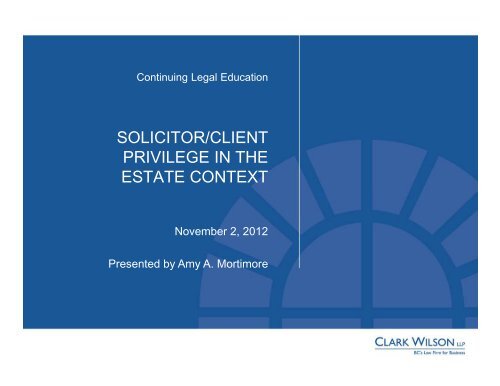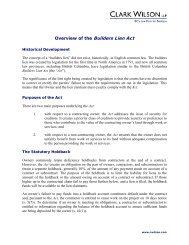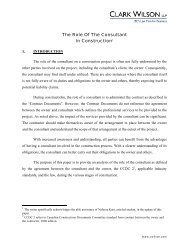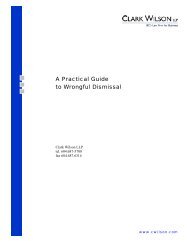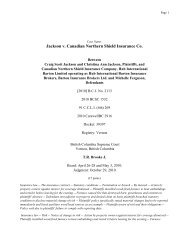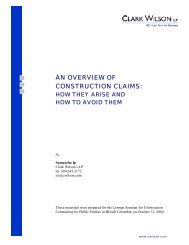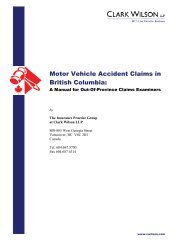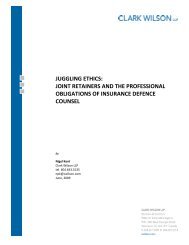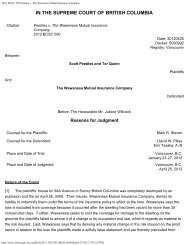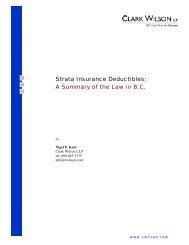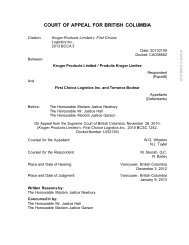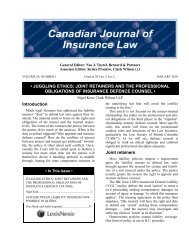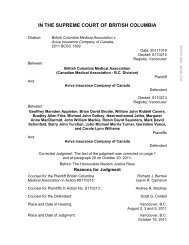Solicitor Client Privilege in the Estate Context - Clark Wilson LLP
Solicitor Client Privilege in the Estate Context - Clark Wilson LLP
Solicitor Client Privilege in the Estate Context - Clark Wilson LLP
You also want an ePaper? Increase the reach of your titles
YUMPU automatically turns print PDFs into web optimized ePapers that Google loves.
Introduction• <strong>Solicitor</strong>/<strong>Client</strong> <strong>Privilege</strong>:• one of <strong>the</strong> very cornerstones of our legal system• dates back to <strong>the</strong> 16 th century• prohibits <strong>the</strong> disclosure to o<strong>the</strong>rs of <strong>the</strong>documentary and oral <strong>in</strong>formation pass<strong>in</strong>gbetween a lawyer and his or her client1
Outl<strong>in</strong>e of Presentation1. What is solicitor/client privilege?2. Who has <strong>the</strong> authority to waive <strong>the</strong>solicitor/client privilege?3. What is <strong>the</strong> “wills exception”?4. How does solicitor/client privilege differ from <strong>the</strong>lawyer’s ethical duty of confidentiality?2
Who Has Authority to Waive <strong>Solicitor</strong>/<strong>Client</strong><strong>Privilege</strong>?• <strong>the</strong> privilege belongs to <strong>the</strong> client• it is <strong>the</strong> solicitor’s duty to claim <strong>the</strong> privilege onbehalf of <strong>the</strong> client when someone o<strong>the</strong>r than <strong>the</strong>client requests <strong>the</strong> file• <strong>the</strong> privilege survives <strong>the</strong> death of a client andenures to his or her next of k<strong>in</strong>, heirs, orsuccessors <strong>in</strong> title• <strong>the</strong> personal representative may waive privilegeover <strong>the</strong> deceased’s file4
Express and Implied Waiver of <strong>Privilege</strong>• express waivers may be made for practicalreasons <strong>in</strong> litigation• implied waivers may arise <strong>in</strong>advertently through apartial disclosure• whe<strong>the</strong>r or not a partial disclosure amounts to awaiver will turn on <strong>the</strong> facts and on issues offairness5
What is The Wills Exception?Start<strong>in</strong>g Po<strong>in</strong>t:• <strong>the</strong> last will itself is not privileged after death• <strong>the</strong> communications lead<strong>in</strong>g to <strong>the</strong> draft<strong>in</strong>g andexecution of <strong>the</strong> will are privileged, both beforeand after death6
What is The Wills Exception? (cont’d)• where a testator’s “true <strong>in</strong>tention” is at issue,communications that are o<strong>the</strong>rwise privilegedmay be disclosed• <strong>in</strong> both <strong>the</strong> <strong>in</strong>terest of <strong>the</strong> client and <strong>the</strong> <strong>in</strong>terestof justice that <strong>the</strong> relevant evidence of <strong>the</strong>solicitor be admitted• Geffen v. Goodman <strong>Estate</strong> 1991 SCC expandedto <strong>in</strong>clude <strong>in</strong>ter vivos trusts conta<strong>in</strong><strong>in</strong>g life andrema<strong>in</strong>der <strong>in</strong>terests7
What is The Wills Exception? (cont’d)Cases Subsequent to Geffen• Fawcett <strong>Estate</strong> v. Ste<strong>in</strong>er 1998 BCSC• Wood v. Wilkie 2012 BCSC• BUT SEE Kreeft v. Kreeft 2006 BCSC8
<strong>Solicitor</strong>/<strong>Client</strong> <strong>Privilege</strong> <strong>in</strong> <strong>the</strong> <strong>Context</strong> ofCommittees• not yet wholly settled• Canada Trust Co. v. R<strong>in</strong>grose 2009• Re Palamarek 2010 BCSC• ethical perspective: duty of confidentiality <strong>the</strong>Law Society Ethics Committee memo atAppendix A9
<strong>Solicitor</strong>/<strong>Client</strong> <strong>Privilege</strong> <strong>in</strong> <strong>the</strong> <strong>Context</strong> of aBankruptcy• Re Bre-X M<strong>in</strong>erals Ltd., 1998 CarswellAlta 1061• trustee <strong>in</strong> bankruptcy applied for an order that itcould waive Bre-X’s solicitor/client privilege• sought to rely on case law permitt<strong>in</strong>g <strong>the</strong>executor of an estate to waive privilege• <strong>the</strong> court rejected <strong>the</strong> argument10
How Does <strong>Solicitor</strong>/<strong>Client</strong> <strong>Privilege</strong> Differfrom a Lawyer’s Duty of Confidentiality?• <strong>in</strong> addition to <strong>the</strong> solicitor/client privilege• bound by his or her own professional and ethicalduty to ma<strong>in</strong>ta<strong>in</strong> <strong>the</strong> client’s confidence• Professional Conduct Handbook Chapter 511
Duty of ConfidentialityChapter 5.1 reads:1. A lawyer shall hold <strong>in</strong> strict confidence all<strong>in</strong>formation concern<strong>in</strong>g <strong>the</strong> bus<strong>in</strong>ess and affairsof <strong>the</strong> client acquired <strong>in</strong> <strong>the</strong> course of <strong>the</strong>professional relationship, regardless of <strong>the</strong>nature or sources of <strong>the</strong> <strong>in</strong>formation or of <strong>the</strong> factthat o<strong>the</strong>rs may share <strong>the</strong> knowledge, and shallnot divulge any such <strong>in</strong>formation unlessdisclosure is expressly or impliedly authorized by<strong>the</strong> client, or is required by law or by a court.12
Duty of Confidentiality (cont’d)• survives <strong>the</strong> end of <strong>the</strong> legal relationship• some limited exceptions, <strong>in</strong>clud<strong>in</strong>g disclosure toprevent death or serious bodily harm to anyperson• when required to disclose, ensure only <strong>the</strong>m<strong>in</strong>imum <strong>in</strong>formation is disclosed13
Duty of Confidentiality (cont’d)The Professional Conduct Handbook is scheduledto be replaced by <strong>the</strong> Code of Professional Conductfor BC on January 1, 2013.14
Conclusion• communications between ourselves and ourclients subject to both solicitor/client privilegeand duty of confidentiality• critical that we ma<strong>in</strong>ta<strong>in</strong> our clients’ confidences• critical we assert <strong>the</strong> privilege when called uponto do so• generally, it is proper for <strong>the</strong> lawyer to require<strong>the</strong> request<strong>in</strong>g party to obta<strong>in</strong> a court order15
THANK YOUThese materials are necessarily of a generalnature and do not take <strong>in</strong>to considerationany specific matter, client or fact pattern.Please direct <strong>in</strong>quiries or comments to:Amy Mortimore, <strong>Clark</strong> <strong>Wilson</strong> <strong>LLP</strong>aam@cwilson.com | 604.643.3177www.cwilson.com


